Dentures – San Ramon, CA
Refill and Rebuild Your Smile
If you’re frustrated by or feeling self-conscious about missing teeth, your dentist at Gale Ranch Family Dental can refill and rebuild your smile with dentures. This is the tried-and-true method for replacing your grin after tooth loss because it restores so much of your ability to eat and speak like you used to. Whether you require a full or partial set, there’s a solution to help! Contact our office today to request additional information or schedule an appointment.
Why Choose Gale Ranch Family Dental for Dentures?
- Flexible Financing Available
- Individualized Treatments Plans
- High-Quality, Lifelike Materials
Who’s a Good Candidate for Dentures?

Have you lost multiple or even all of your teeth? If so, you may be a good candidate for dentures in San Ramon. These oral prosthetics can quickly restore multiple missing teeth, helping you enjoy a complete and healthy smile once again. During your initial appointment, our team will assess your oral health and review your medical history to determine if dentures are right for you. In the meantime, here are a few important points to consider.
Effects of Missing Teeth
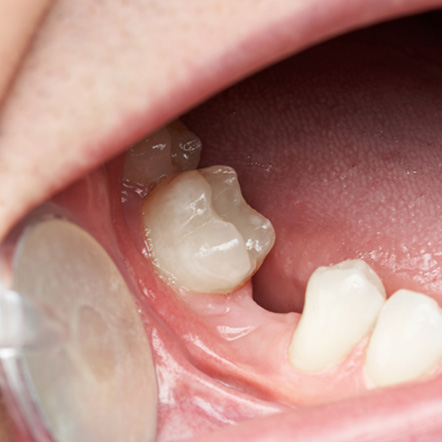
Missing teeth, whether due to severe decay, damage, or age-related oral issues, can have a significant impact on your mouth. Here are some potential negative effects of gaps in your smile:
- Bite problems as your remaining teeth shift to close the gaps.
- Digestive issues from improperly chewed food.
- Facial sagging caused by jawbone deterioration, which weakens support for facial muscles.
- Speech difficulties due to the absence of teeth affecting your tongue’s movement.
- Reduced self-esteem and confidence from the aesthetic impact of a compromised smile.
- Increased risk of TMJ pain as remaining teeth overcompensate for the missing ones.
What Qualifies You for Dentures?

Before you can be fitted for dentures, you need to have a consultation visit with our team. They’ll examine your teeth and gums to determine your oral condition, as well as learn about your medical history and dental needs. If they find any areas of concern, like tooth decay or gum disease, they’ll work with you to address it before proceeding. Then, they’ll provide recommendations to help you reach your goals and replace your lost teeth.
Alternative Tooth-Replacement Options
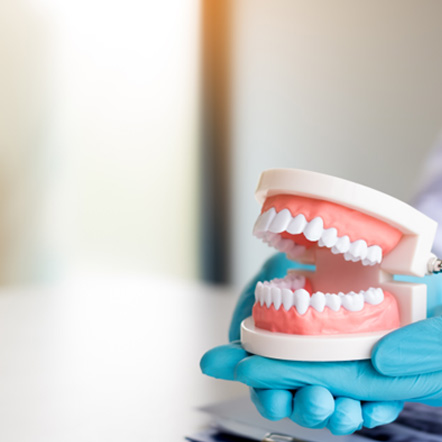
If dentures aren’t a suitable option for you, there’s no need to worry. We offer alternative tooth replacement solutions that might better meet your needs:
- Dental Bridges – A great option if you’re missing one or several teeth in a row. This typically involves preparing the healthy teeth on either side of the gap to support the bridge. With proper care, the results can last 10+ years.
- Dental Implants – For a more stable and durable solution, dental implants could be the ideal choice. These titanium posts are surgically placed into the jawbone, recreating the entire tooth structure from root to crown. While implants require sufficient jawbone density and involve a higher initial cost, their lifelike results can last for decades, or even a lifetime, with minimal upkeep.
Types of Dentures

Fortunately, dentures are a versatile solution that can be completely customized to suit your unique circumstances. Our experts will suggest one of the following types based on their findings during your examination:
Partial Dentures
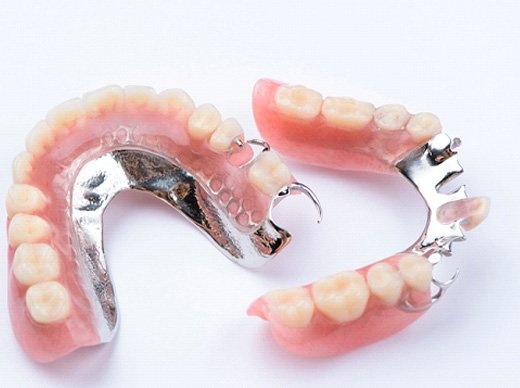
Partial dentures are used for mouths that have lost several teeth but still have some remaining. These are built to fill in the gaps for a seamless appearance. Made from a gum-colored acrylic base, they are often supported by metal for added strength. Yours will be specifically designed to hold the correct number of false teeth (pontics) needed to restore your grin. They anchor to your existing teeth and are easy to remove for cleaning.
Full Dentures
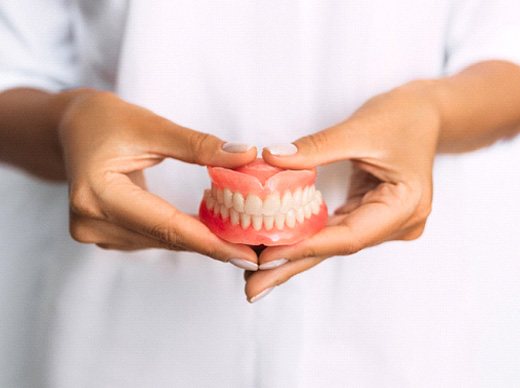
Full dentures are necessary when you have lost all of your natural teeth. They consist of a gum-colored acrylic base that contains an entire set of porcelain or ceramic pontics to entirely refurbish your smile. They are custom-built to fit against your gums closely to have enough suction to remain in place, though sometimes denture adhesive is needed for a firm grasp.
Implant Dentures
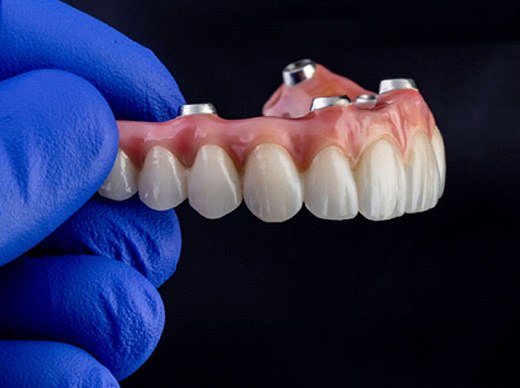
Implant dentures are the only type of permanent dentures because once they’re placed, they’re meant to stay. Instead of taking them out of your mouth to clean them, you’ll simply brush them and any remaining teeth as usual. This method involves surgically implanting titanium posts into your jawbone. They fuse with bone matter as they heal in a process called osseointegration which provides a firm foundation. Then, your dentures will be attached to these posts for maximum stability.
How Dentures Are Made

At Gale Ranch Family Dental, our dentists believe in creating high-quality full, partial, and implant dentures that look and feel completely natural. Using only the best materials and lab technicians to craft these prosthetics, our goal is to deliver one-of-a-kind smiles that allow you to regain your confidence and enjoy life to the fullest. Whether you’re already living with dentures or waiting to receive your new teeth, find out how they’re made so that you can better understand what is required to produce a life-changing smile.
What Are Dentures Made Of?

You can expect your denture base and artificial teeth to be fabricated from the best materials available on the market.
- Denture Base: Your denture base is what serves as the foundation for your prosthetic. Resting on top of the gumline, the acrylic, resin, or nylon that is used mimics the natural color of your gum tissue. While full dentures rely on suction to remain in place, partials are built with metal or plastic clasps that attach to regular teeth. Implant dentures are affixed to titanium posts that fuse with the jawbone.
- Artificial Teeth: Your replacement teeth are attached to the denture base to create a fully restored smile once in place. Commonly made from porcelain or resin because of how they reflect light similarly to natural tooth enamel, they can be crafted to blend in with any remaining teeth so that others have a hard time telling the difference between your real and artificial teeth.
The Denture Creation Process

No two dentures are the same, as each is crafted by a skilled lab technician who builds the prosthetics using an impression of your smile. These scans of your gumline will be taken by our Gale Ranch Family Dental team so that a high-resolution model forms and can be used to build a wax version of your mouth.
Once the technicians have the wax model, they will place it in an articulator and customize the model so that it fits appropriately along the gumline and does not experience any functional issues (i.e., opening and closing of the mouth, etc.). After filling the wax mold with plaster, the shape of your dentures will be formed before all excess wax is melted.
Technicians will then add the desired material (i.e., acrylic, nylon, or resin) into the mold so that your new dentures are complete. They’ll be returned to our dental office where you will receive your dental prosthetics and ensure a comfortable fit.
Adjusting to Your New Dentures

It’s common to go through an adjustment phase after receiving dentures. Whether you’re having them fitted for the first time or replacing an old set of teeth with a new one, you may find that you develop a slight lisp as well as soreness. Fortunately, this will go away over time, and with practice, you can restore your speech and begin to sound “normal” again.
The Benefits of Dentures

Dentures are life-changing for people who are missing several, most of, or all of their teeth! This tooth replacement option can restore the appearance and function of your smile. Read on to learn about some of the incredible benefits that denture-wearers can expect.
Psychological Benefits

If you don’t have any healthy teeth, it can be a challenging thing to accept. Many sufferers of extensive tooth loss encounter negative effects on their self-esteem and confidence, leading to a higher risk of sadness and depression. By restoring your smile with dentures, you can feel better about your image, reducing anxieties about your appearance, speech articulation, chewing ability, and more!
Clearer Enunciation

When you have spaces in your smile, it can be much more difficult to enunciate certain sounds and say different words. To pronounce words, your lips and tongue need to be positioned in a specific way. With gaps in your smile, your tongue isn’t able to sit against the teeth, making some words nearly impossible to say clearly.
Improves Nutrition

Many nutrient-dense foods are tough in texture. This includes healthy proteins, fruits, and veggies. If you aren’t able to chew your food thoroughly due to tooth loss, this can negatively impact your eating habits, resulting in indigestion and malnutrition. With dentures, you can chew your food more easily, allowing you to enjoy an expansive diet.
Preserves Oral Health

If you still have some healthy teeth, dentures can help to keep them in even better shape. By filling in the gaps with a partial denture, you can keep the surrounding teeth from shifting around. Dentures also help to bear some of the weight of routine biting and chewing, limiting wear and tear on the existing teeth.
Expands Opportunities

Making a good first impression is necessary when you attend interviews, negotiate sales, and attend social events. Your smile is one of the very first things that people notice about you, so having teeth that appear to be healthy will do nothing but help. In fact, studies have found that the probability of being employed is negatively associated with poor dental health.
Dentures Aftercare

Taking care of your dentures is just as important as taking care of natural teeth! Proper maintenance will help your prosthetic last longer, perform better, and be less likely to make you sick through oral bacteria build up.
Denture aftercare isn’t especially complicated, but there are multiple steps to remember. To make it simple, we’ve outlined what you should do in an easy-to-read list. Feel free to check it out, and don’t forget that we’re always here to help if you have any questions!
Remove After Eating
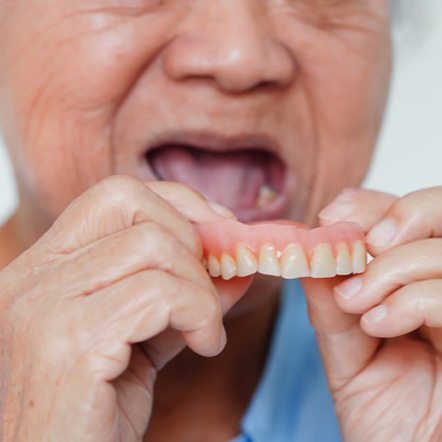
After every meal, it’s important to run your dentures under the sink and give them a good rinse. This will help dislodge any food particles stuck between the false teeth or trapped underneath the prosthetic, keeping your mouth fresh, clean, and odor free!
Clean Your Restoration
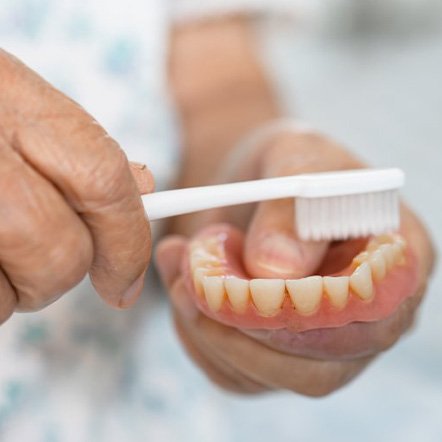
Start getting into the habit of brushing your dentures when you wake in the morning and before you go to bed at night. This is the primary way you’ll be able to keep bacteria build up to a minimum. Use a soft-bristled toothbrush and either hand soap or dish soap to clean them without causing excessive wear.
Keep Your Dentures Safe
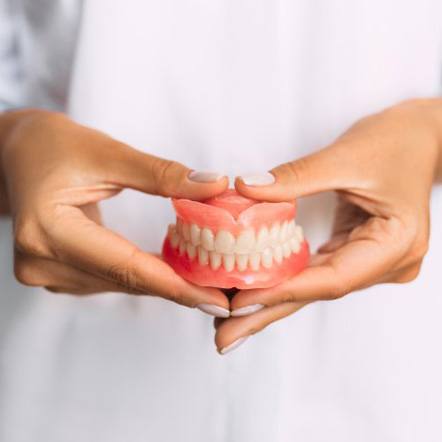
Accidents happen, but that doesn’t mean there aren’t ways to reduce the risk! When not actively wearing your dentures, secure them in a safe container or location. Countertops and side tables simply have too much bacteria to be a good resting spot for your prosthetic, and it’s probably best to keep your dentures out of the reach of curious children or pets.
Remove When You Sleep

Not everyone knows this, but wearing your dentures 24/7 isn’t good for your oral health. Leaving them in your mouth overnight increases your risk of pneumonia and doesn’t give your gums the opportunity to circulate. Remove your dentures before you lay down to sleep at night, and consider soaking them in a denture cleaning solution. It’s another quick, easy way to keep your dental appliance pristine!
Notice Changes
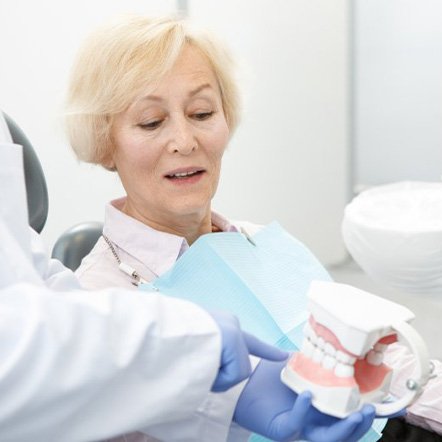
Over time, your mouth structure is likely to change. That’s just how biology works. This means that your dentures might very well reach a point where they no longer fit like they should. If that happens, give us a call. We can adjust them so that they sit more comfortably on your gums and don’t cause irritation or bite issues.
Other changes to look out for include your oral health and signs of denture wear. Mouth sores, bleeding gums, and other such uncomfortable symptoms can also indicate that it’s time for an adjustment or replacement. Chipped, broken, or otherwise worn-down dentures should be repaired by a qualified professional – in other words, us! DIY methods might seem more convenient, but they often cause more harm than good.
Understanding the Cost of Dentures

It’s natural to have questions about rebuilding your smile with dentures. For example, many patients are curious how much they can expect to pay to rebuild their arches before committing to treatment.
Our team in San Ramon is happy to provide a detailed estimate after your initial consultation based on your individual circumstances. Continue reading to learn how the cost is determined and how our office helps make services more affordable!
Factors That Affect the Cost of Dentures

The cost of these restorations can vary from person to person because it depends significantly on different factors unique to your situation, such as:
- Your current dental condition. Many patients require other services, like gum disease treatment or extractions to remove remaining teeth, before proceeding, which can increase your final invoice.
- The material used for the base. The gum-colored foundation can be made from various materials, such as resin or acrylic, which can affect the rate.
- How the teeth are built. The pontics (teeth) can be designed from resilient acrylic or porcelain, which have different price points.
Are Implant Dentures More Expensive?

Unlike standard dentures, this solution involves placing anywhere from four to eight support rods into your jaw to anchor a specially designed arch of teeth. Although this solution typically lasts longer and preserves your oral health more effectively, it involves oral surgery, which comes with its own associated fees.
As a result, implant dentures might initially be more expensive than their traditional counterparts. However, there’s no need to regularly purchase products and accessories, such as special soaking solutions, adhesives, brushes, and cleaners, which can add up over time. Plus, you’re less likely to need costly relining, repairs, or replacement, which can save you money over time.
Does Dental Insurance Cover Dentures?

Many dental insurance policies include 50% of the cost of dentures, but there’s no guarantee that your restoration will be included. Furthermore, many plans have additional restrictions to be aware of, such as a deductible amount that must be paid or a waiting period that must pass.
If you’re unsure whether your treatment will be covered by insurance, feel free to contact us. Our friendly office staff is happy to assist with submitting claims on your behalf and helping you maximize any applicable benefits.
Other Options for Making Dentures Affordable

Our team in San Ramon happily welcomes many types of dental insurance, and we are considered in-network with several major providers to help reduce out-of-pocket expenses for your visit. However, we understand that not everyone has a policy, and we don’t want your personal finances to affect your dental care.
If you’re concerned you can’t afford to rebuild your smile with dentures, you might benefit from a flexible financial plan through CareCredit. If your application is approved, you can divide your total invoice into more manageable installments over a designated period.
Dentures FAQs
Do Dentures Break Easily?
Dentures are quite durable, but they are not indestructible and will eventually need replacement. With excellent care, your appliance may last between five and seven years, but accidents that make early replacement necessary can happen. Dentures are sometimes dropped when they are being removed, inserted or cleaned, and they can break due to repeated pressure or tiny defects in their bases such as notches or scratches. To keep your appliance in excellent shape, keep the following tips from the team at Gale Ranch Family Dental in mind:
- Never treat your dentures with hot or cold water.
- Fill the basin of your sink with lukewarm water and cover your countertop with folded towels before cleaning your dentures to create a cushion in case you drop them.
- Soak your dentures when not wearing them to prevent them from drying out and warping.
- Be mindful when chewing to avoid unnecessary strain to your appliance.
- Keep your dentures out of reach for children and pets.
What Should You Do If Your Dentures Break?
“Prosthesis fracture,” meaning an appliance has broken in half, is the most serious complication a denture can experience. While this is more common for top dentures, it can happen to bottom ones as well. Depending on the nature and severity of the damage to your denture, the team at Gale Ranch Family Dental may be able fix it. In some cases, we may have to send your appliance to a trusted dental lab for adjustments, and it will eventually be necessary to replace your dentures altogether.
Are Denture Adhesives Safe?
Denture adhesives can be safe if used in moderation or as recommended by the team at Gale Ranch Family Dental. However, it’s important to be cautious of products that contain zinc since this mineral can cause nerve damage if ingested in excessive amounts. You’ll also need to take care to thoroughly clean your denture before soaking it to remove any lingering adhesive residue. The FDA recommends the following guidelines when using denture adhesive:
- Comply with the instructions printed on the product’s label.
- Refrain from using more adhesive than recommended.
- Keep in mind that some products may not list all their ingredients.
- Keep track of how much adhesive you use every day.
- Cease use of denture adhesive if you experience numbness or tingling sensations.
If you have been wearing your denture for a while and find that it is no longer fitting comfortably, it may need an adjustment such as a reline. Denture adhesives can be a suitable way to help your appliance fit properly and work well between relines.
Can I Sleep with My Dentures?
Our dentists here at Gale Ranch Family Dental generally advise against sleeping in your dentures. Wearing them at night can restrict gum circulation, which can cause soft tissue irritation and potentially speed up the deterioration of your jawbone. Additionally, the moist environment under your dentures is a breeding ground for bacterial growth. As you swallow or breathe in these bacteria while you sleep, it can increase the risk of pneumonia and oral health issues. So, give your gums a break while you sleep and put them in a glass of cold water to soak overnight.
What’s the Average Age to Get Dentures?
Not every patient will need dentures in their lifetime, but tooth loss naturally becomes more prevalent with age. This skews the age range in favor of older adults. In fact, statistics show that about 66% of adults aged 40-64 have at least one missing tooth, and nearly 57% of people aged 65-74 wear some form of denture.
However, it’s important to remember that tooth loss can happen at any age from trauma, decay, or genetic conditions beyond a patient’s control. While aging increases the likelihood of needing dentures, patients of any age can benefit from them.
Is it Hard to Talk with Dentures?
Your speech may initially be slightly affected by changes in palate shape, leading to lisping or difficulty pronouncing certain words. But there’s no need to worry! Your mouth will adjust within a few weeks, especially if you’re practicing difficult words, speaking slowly, and reading aloud. If you’re having a lot of trouble in the first week or so, you can use denture adhesive to give you extra stability as you adjust to your prosthetics. Practice makes perfect!
Can I Have My Dentures Relined if They Don’t Fit?
Dentures naturally wear down over time through normal use and may need relining if they no longer fit properly. Changes in your bone structure and gumline can also prompt the need for adjustments. It’s important to see your dentist as soon as possible if you start to notice oral sores, gum irritation, or increased instability. They can examine your dentures and your teeth and determine the type of reline you need.
Soft relines use gel-like cushions to spare sensitive gums and can usually be performed at our office. However, hard relines are used to address more extensive changes and will need to be done at one of our partnered dental labs. This process can take a couple of weeks to finish, so your dentist will give you some temporary dentures to use while you wait so you’re not without teeth.
